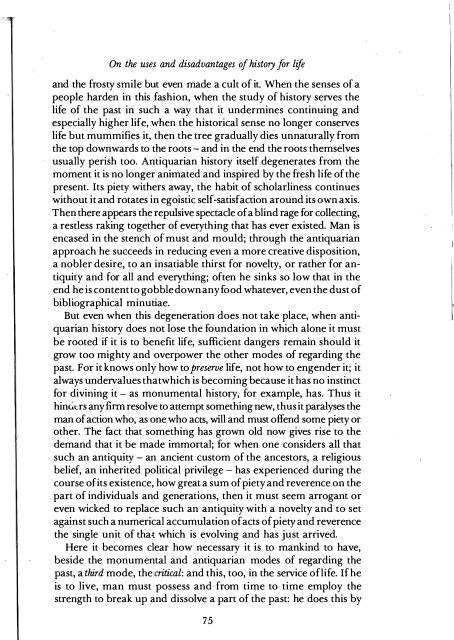Friedrich_Nietzsche - Untimely_Meditations_(Cambridge_Texts_in_the_History_of_Philosophy__1997)
Friedrich_Nietzsche - Untimely_Meditations_(Cambridge_Texts_in_the_History_of_Philosophy__1997)
Friedrich_Nietzsche - Untimely_Meditations_(Cambridge_Texts_in_the_History_of_Philosophy__1997)
You also want an ePaper? Increase the reach of your titles
YUMPU automatically turns print PDFs into web optimized ePapers that Google loves.
On <strong>the</strong> uses and disadvantages <strong>of</strong> history for lifeand <strong>the</strong> frosty smile but even made a cult <strong>of</strong> it. When <strong>the</strong> senses <strong>of</strong> apeople harden <strong>in</strong> this fashion, when <strong>the</strong> study <strong>of</strong> history selVes <strong>the</strong>life <strong>of</strong> <strong>the</strong> past <strong>in</strong> such a way that it underm<strong>in</strong>es cont<strong>in</strong>u<strong>in</strong>g andespecially higher life, when <strong>the</strong> historical sense no longer conselVeslife but mummifies it, <strong>the</strong>n <strong>the</strong> tree gradually dies unnaturally from<strong>the</strong> top downwards to <strong>the</strong> roots - and <strong>in</strong> <strong>the</strong> end <strong>the</strong> roots <strong>the</strong>mselvesusually perish too. Antiquarian history itself degenerates from <strong>the</strong>moment it is no longer animated and <strong>in</strong>spired by <strong>the</strong> fresh life <strong>of</strong> <strong>the</strong>present. Its piety wi<strong>the</strong>rs away, <strong>the</strong> habit <strong>of</strong> scholarl<strong>in</strong>ess cont<strong>in</strong>ueswithout it and rotates <strong>in</strong> egoistic self-satisfaction around its own axis.Then <strong>the</strong>re appears <strong>the</strong> repulsive spectacle <strong>of</strong> a bl<strong>in</strong>d rage for collect<strong>in</strong>g,a restless rak<strong>in</strong>g toge<strong>the</strong>r <strong>of</strong> everyth<strong>in</strong>g that has ever existed. Man isencased <strong>in</strong> <strong>the</strong> stench <strong>of</strong> must and mould; through <strong>the</strong> antiquarianapproach he succeeds <strong>in</strong> reduc<strong>in</strong>g even a more creative disposition,a nobler desire, to an <strong>in</strong>satiable thirst for novelty, or ra<strong>the</strong>r for antiquityand for all and everyth<strong>in</strong>g; <strong>of</strong>ten he s<strong>in</strong>ks so low that <strong>in</strong> <strong>the</strong>end he is content to gobble down any fo od whatever, even <strong>the</strong> dust <strong>of</strong>bibliographical m<strong>in</strong>utiae.But even when this degeneration does not take place, when antiquarianhistory does not lose <strong>the</strong> fo undation <strong>in</strong> which alone it mustbe rooted if it is to benefit life, sufficient dangers rema<strong>in</strong> should itgrow too mighty and overpower <strong>the</strong> o<strong>the</strong>r modes <strong>of</strong> regard<strong>in</strong>g <strong>the</strong>past. For it knows only how to preserve life, not how to engender it; italways undeIValues that which is becom<strong>in</strong>g because it has no <strong>in</strong>st<strong>in</strong>ctfor div<strong>in</strong><strong>in</strong>g it as monumental history, for example, has. Thus ith<strong>in</strong>t.rs any firm resolve to attempt someth<strong>in</strong>g new, thus it paralyses <strong>the</strong>man <strong>of</strong> action who, as one who acts, will and must <strong>of</strong>fend some piety oro<strong>the</strong>r. The fact that someth<strong>in</strong>g has grown old now gives rise to <strong>the</strong>demand that it be made immortal; for when one considers all thatsuch an antiquity - an ancient custom <strong>of</strong> <strong>the</strong> ancestors, a religiousbelief, an <strong>in</strong>herited political privilege - has experienced dur<strong>in</strong>g <strong>the</strong>course <strong>of</strong> its existence, how great a sum <strong>of</strong> piety and reverence on <strong>the</strong>part <strong>of</strong> <strong>in</strong>dividuals and generations, <strong>the</strong>n it must seem arrogant oreven wicked to replace such an antiquity with a novelty and to setaga<strong>in</strong>st such a numerical accumulation <strong>of</strong> acts <strong>of</strong> piety and reverence<strong>the</strong> s<strong>in</strong>gle unit <strong>of</strong> that which is evolv<strong>in</strong>g and has just arrived.Here it becomes clear how necessary it is to mank<strong>in</strong>d to have,beside <strong>the</strong> monumental and antiquarian modes <strong>of</strong> regard<strong>in</strong>g <strong>the</strong>past, a third mode, <strong>the</strong> critical: and this, too, <strong>in</strong> <strong>the</strong> seIVice <strong>of</strong>life. Ifheis to live, man must possess and from time to time employ <strong>the</strong>strength to break up and dissolve a part <strong>of</strong> <strong>the</strong> past: he does this by75


